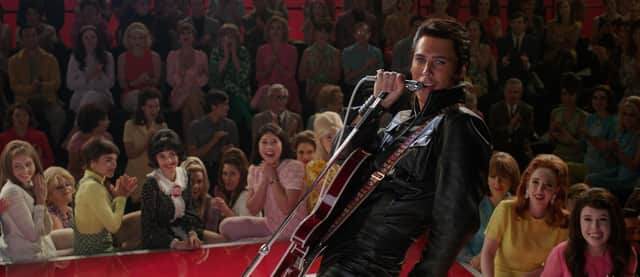Film reviews: Elvis | Moon, 66 Questions | The Big Hit


Elvis (12A) ****
The Big Hit (15) **
Moulin Rouge director Baz Luhrmann’s penchant for ritzy, glitzy, musical excess finds a suitable subject in Elvis, a cradle-to-the-grave biopic of the king of rock ’n’ roll whose sad and tragic end as a Las Vegas cash cow provides a Gatsby-esque critique of the self-mythologising nature of the American Dream. Luhrmann’s last film was, of course, his wilfully over-the-top adaptation of F Scott Fitzgerald’s classic and he brings a lot of its stylistic excesses to bear on Presley’s life, albeit in a way that captures not just the shallowness of show business when the money takes over, but the thrill of a phenomenon as it’s taking shape.
Starring the relatively unknown Austin Butler as Presley and a prosthetically podgy Tom Hanks as his all-controlling manager Colonel Tom Parker, the film uses Parker as its unreliable narrator, kicking off in 1997, with Parker near the end of his life, full of self-pity as he recounts how he’s become the villain of this story. He undoubtedly is, too. A carnival huckster of mysterious origin, he sees dollar signs the moment he first hears Elvis and coerces him into signing an exclusive, exploitative contract during a scene that Luhrmann stages in a funfair hall of mirrors – an ominous portent of the disorientating reality into which he’s about to cast Elvis.
Advertisement
Hide AdSubverting his own nice guy image to compellingly grotesque effect, Hanks’s toad-like performance and comically absurd Euro-pudding accent certainly stands in marked contrast to the all-American boy Parker is intent on selling to the world. Yet Butler’s casting as Elvis is canny too. He may not be as pretty as Presley in his prime (though realistically, who is?), but as a former child actor whose most prominent adult role thus far has been Charles Manson disciple Tex Watson in Once Upon a Time… in Hollywood, he conveys the innocence and danger that made Elvis such a force to be reckoned when he first emerged.
These early performance scenes are especially good. Luhrmann uses a full arsenal of crash cuts and crotch zooms to depict the hormone juicing, underwear dampening excitement Elvis and his pelvis induced in scores of girls, women and boys unused to confronting their own sexual desires. But he also takes care to acknowledge the lineage of Black artists whose music Elvis absorbed by osmosis as a dirt poor white kid raised in a mostly Black neighbourhood. Crosscutting performance sequences throughout his career with scenes of Elvis as a kid sneaking into blues clubs and gospel churches, the film presents Elvis’s music not as an act of cultural appropriation (at least not on his part), so much as a subconscious fusion of styles by someone who respected where he came from.
Nevertheless, Luhrmann is also careful not to make any big claims for Elvis’s music breaking down racial barriers. We may repeatedly come back to how obsessed Elvis was with comic book hero Captain Marvel Jr as a kid, but he’s no saviour: we see him reluctantly play segregated shows (unlike the Beatles – seen briefly in archival footage – who refused to do so). But film is also trying to put us in the moment with Elvis as he processes the craziness of his world and the world around him. He’s the first global pop superstar through the gate; there wasn’t exactly a playbook on how to conduct a career.
The film has a lot of ground to cover in its 160-minute run time, which may be why Luhrmann does it all at frenetic pace – although that also feels apropos for the life unfurling on screen. As it spins through the flashpoint moments of his life, roulette wheels and vinyl records become favoured visual motifs for the relentless cycle Parker subjected Elvis to once he got his claws into him. Mostly, though, Luhrmann does a sensational job of capturing how at home Elvis was on stage – and, more poignantly, how lost he was off it.
Greek filmmaker Jacqueline Lentzou makes an auspicious debut with Moon, 66 Questions, an intriguing portrait of an estranged father-daughter relationship shot through with some of the weirdness of Yorgos Lanthimos’s early films. Guilt-tripped into returning to Athens to look after her ailing father Paris (Lazaros Georgakopoulos) after he’s diagnosed with multiple sclerosis, 20-something Artemis (Sofia Kokkali) finds herself reliving the pain she experienced as a teenager, when her father’s disinterest in her and her mother created an inexplicable barrier between them. The forced physical intimacy of this new dynamic becomes something of an emotional catalyst for Artemis, who starts working through her grievances by subconsciously acting out like teenager – at one point even surprising herself by wilfully wrecking Paris’s car. The film also makes creative use of a stack of VHS home-movies to subtly tease out the mystery at the heart of her Artemis’s dysfunctional family. The end result is unusual and compassionate in equal measure.
French comedy drama The Big Hit writes a cheque with its title that the film itself struggles to cash. Revolving around an actor (Kad Merad) who takes a job teaching drama to inmates, the film hits all the usual inspirational teacher beats as he encourages a rag-tag group of prisoners to stage a production of Samuel Beckett’s Waiting for Godot. The performances are fine, but its sentimental approach is at odds with its subject.
All films on general release from Friday